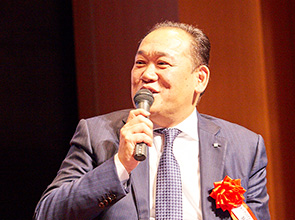Conference on Competitiveness
Interviews with the Prize Winners
Open House Co. Ltd., the Single-Family Homes Division
Interviewer: Professor Ken Kusunoki, Hitotsubashi University Graduate School of International Corporate Strategy (Hitotsubashi ICS)
Interviewee: Mr. Masaaki Arai, President & CEO, Open House Co., Ltd.
Interviewee: Mr. Masaaki Arai, President & CEO, Open House Co., Ltd.

Main Points
- Provides reasonably priced new single-family homes, targeting people with annual incomes between 5 million and 10 million yen, and uses the catchphrase: "Let's find a house in Tokyo."
- Specializes in land with irregularities that take extra effort in design and construction
- Acquires land, making frequent visits to numerous real estate agents its top priority
- Accumulates know-how about design and construction management
- Makes sales pitches "at the source," with the aim of arousing need recognition
- Has established a rapid flow across the supply chain
- Kusunoki:
- Mr. Arai is an extremely aggressive businessperson, somewhat resembling the Sengoku Daimyo [military lords during the "Warring States" period of Japanese history]. He is like Oda Nobunaga, Toyotomi Hideyoshi, and Tokugawa Ieyasu combined. Open House is one of the most rapidly growing companies on the Tokyo Stock Exchange. The company's Single-Family Homes Division has been selected for the Porter Prize, which develops and sells reasonably priced new single-family homes in prime locations in the Greater Tokyo Metropolitan area. These houses are meant to be purchased by first-time homebuyers with annual incomes between 5 million and 10 million yen. The reason your company has been able to achieve rapid growth despite the harsh business environment for single-family homes in Tokyo, where land prices are high, is that Open House acquires the land, builds the house, and then sells house, overseeing every step of this process. First, I would like to ask you what is special about your approach to land acquisition.
- Arai:
- In this industry, the standard practice is to have veterans with extensive experience and good judgement handle all land acquisitions. In contrast, we assign young people to the land acquisition team because they can handle the extensive walking that this job requires and they are also able to visit many more real estate agents in a single day. The average age of our employees engaged in land acquisition is about 25, which is probably more than 10 years younger than the people doing the same work in other companies.
- Kusunoki:
- Why did you give priority to increasing the frequency of visits to real estate agents and making young employees responsible for land acquisitions?
- Arai:
- The real estate industry used to have a relatively high level of income. Selling one house would bring in a large profit for the real estate agent. The staff member in charge of land acquisition would tend to spend much more time visiting real estate agents with whom they had developed a good relationship and very little time with less familiar agents. Meanwhile, the age of real estate agents who were the main source of land was also increasing.
- Kusunoki:
- So, by having your employees move around a lot they can gather much more information. You also seem to have a unique approach for acquiring land. Please tell us about the kinds of land you acquire.
- Arai:
- We look for land that is close to the railway tracks, next to a cemetery, set far back from the road, or triangular in shape. [In other words, the kinds of properties that developers are usually reluctant to purchase.]
- Kusunoki:
- I see. And you can acquire land at a cheaper rate by obtaining the latest information about newly listed properties. Next, I would like to know about your buildings. There are many big home builders. How is Open House different from them?
- Arai:
- Home builders tend to be bound by manuals and rules. Our company deals in conventional wooden framework construction, and we can cater to all kinds of situations.
- Kusunoki:
- In other words, you provide solutions for specific problems, such as small pieces of land or land that is set far back from the road. But, wouldn't such customized solutions result in increased costs?

Mr. Masaaki Arai, President & CEO, Open House Co., Ltd.
|
- Arai:
- We are not home builders. The most important point for us is that we give customers what they want. Builders tend to make the kind of houses they want to build. These houses become "Galapagos-like" for the customers. [This expression is used to refer to something that is increasingly evolved, but separate from the needs of general society.] We give the utmost importance to what our customers are thinking, and what they want. People wanted tiled houses about 20 or 30 years ago, but customers now want houses that represent themselves. They don't want anything beyond the necessities. Most big names in this industry are companies that build houses. But we started as a real estate agency, so we want people to like our products and buy them.
- Kusunoki:
- Your approach to sales is also completely different from other companies. You engage in what is called "selling at the source." Please tell us more about that.
- Arai:
- "Selling at the source" means approaching potential customers on the street at a location that is in close proximity to the listed real estate property.
- Kusunoki:
- I've heard that this technique is very effective.
- Arai:
- We know from experience that 70 to 80 percent of the people who buy a new house will choose a location that is very close to their previous residence. So, I think it is a rational approach. But other companies tend to avoid this approach.
- Kusunoki:
- You would also have much more frequent contact with potential customers, making sales pitches at a location that is close to the property. Selling newly built houses in Japan's capital must provide a sense of achievement to young employees because a house is an expensive product.
- Arai:
- That's right. But, it's not as if young employees handle everything from beginning to end. We work in teams, and experts join the team at important points in the process.
- Kusunoki:
- We have heard about the three stages. The secret to high profits lies in linking these stages seamlessly, and advancing this cycle at a rapid pace. There is no doubt that Open House is performing well, but what deserves special attention is that its ROIC (return on invested capital) is extremely high. The speed of this cycle is the key here. Please tell us why ROIC is important in the real estate business.
- Arai:
- We are very particular about our ROIC. Companies that are not in a zaibatsu group find it difficult to survive in this industry, primarily because the market keeps changing. So, it is important to lighten our balance sheet to keep the company going in difficult times. For this reason, we move through this cycle rapidly. That is why the proportion of own capital is higher for individual companies than for zaibatsu companies.
- Kusunoki:
- Although you belong to a different industry, your approach seems similar to Uniqlo's SPA (specialty store retailer of private label apparel) business model in the sense that you compete by integrating stages that were separate, and by emphasizing speed.
I hear that you are also considering using smart, connected products, which we heard about in Professor Porter's lecture.
- Arai:
- It is still at the ideation level. We are considering a higher level than ordinary smart houses. If we decide to pursue this direction, we want to do something new which will set us completely apart from other companies.
- Kusunoki:
- Since your housing starts are large in number, I think we can look forward to a competitive advantage in networking.
Winners PDF
- 第17回 ポーター賞受賞企業・事業 PDF (All of the award company in this year are published. )






